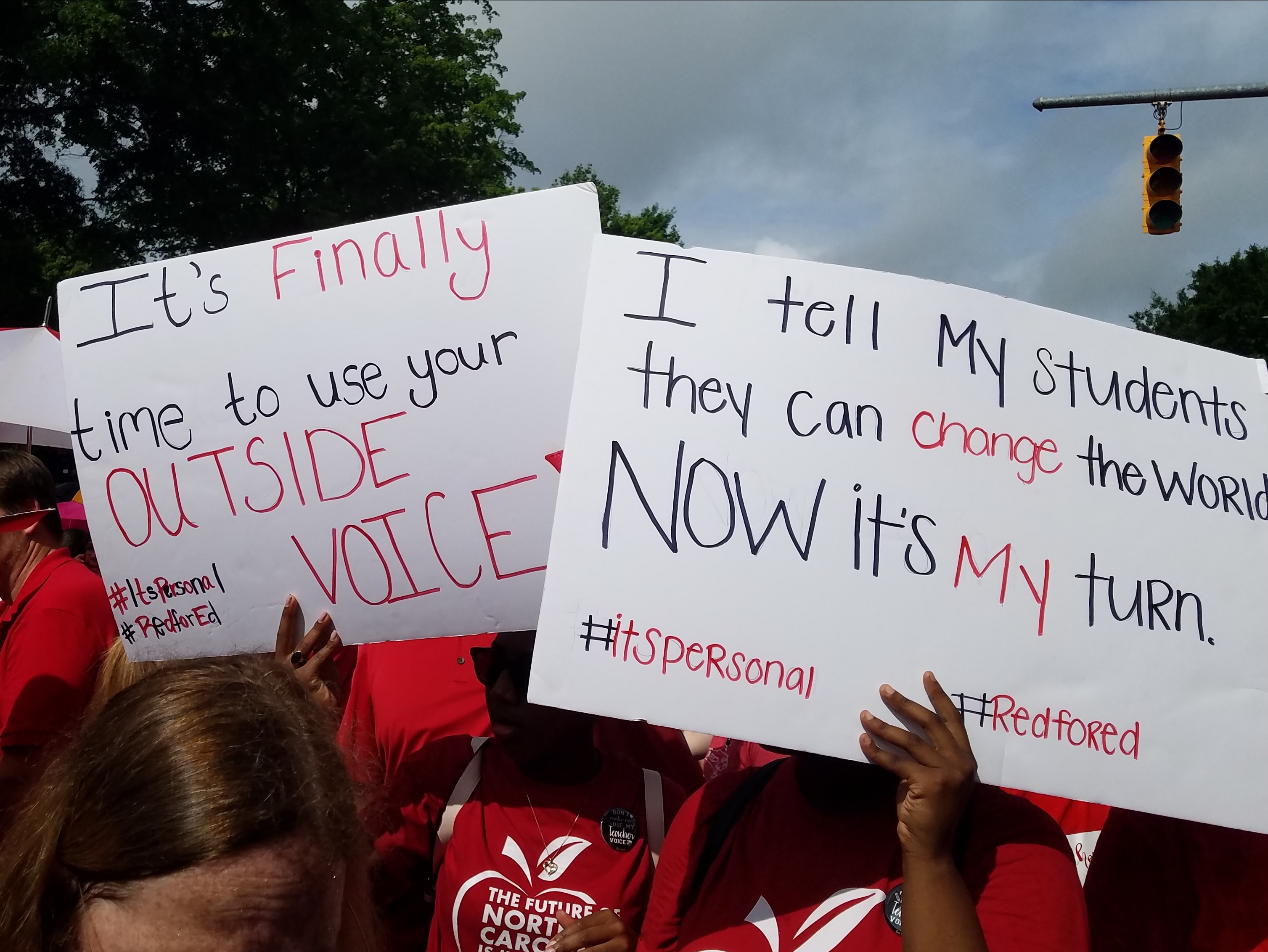On May 16, 2018, the North Carolina Association of Educators (NCAE) hosted a march in Raleigh where an estimated 19,000 people rallied together to bring awareness to the lack of classroom funding and budget cuts to the North Carolina public school system. The march began at 10 a.m. in front of the NCAE Headquarters and teachers assembled in the legislative building, demanding respect from lawmakers for their profession and better resources for students.
“[The rally] is not only about teacher salary,” said Kathleen Greenlee, an English teacher who attended the rally. “I think the big misconception is that people think teachers just want more money, and of course in any profession most people would love to have more money, but it’s about dollars per student, the perception of teachers as a whole and funding for public schools, not just the teachers.”
It was decided in a unanimous 5-0 Board of Education vote that Chatham County Schools would join the more than 30 other school districts that canceled classes due to the number of teachers taking personal days to participate in the “March for Students, Rally for Respect” movement. Northwood teachers who supported the rally said that this march was an opportunity for issues regarding public education to get some attention from lawmakers and the surrounding community. Although some lawmakers, like Republican representative Mark Brody, vehemently disagree.
“The hypocrisy is that they say they are supporting the students,” Brody said in a recent Facebook post. “One less day of instruction does not help the students. Teaching our children that it is OK to not show up for work does not set a good example.”
Theatre arts teacher Kayla Sharp holds a dissenting opinion.
“I think if you just say you support it and you’re just being very passive about the issue, it can be brushed under the rug very quickly,” Sharp said. “Even though this may disrupt the school day or people’s lives, it will make them stop and think why are they doing this and the issue might get some attention from people who are not educators.”
Some teachers who participated in the rally were amazed at the size of the crowd and left feeling invigorated by the experience.
“The solidarity to me was just amazing and I had no idea the size of the crowd until I stopped and looked at an aerial view of the amount of people that were there,” Greenlee said. “A lot of students were lined up on the side and held up signs in support of teachers. There were also parents in the crowd, spouses of teachers and other community members, so it was overall a positive event.”
Even with the estimated 19,000 in attendance, English teacher Justice Mansour felt the movement was well organized.
“[The rally] was definitely well organized and the NCAE president put a lot of effort into making sure that teachers knew where they needed to go,” Mansour said. “There was a phone call the night before laying out the bus route and what our main talking points were.”
One of the main objectives of the rally was for educators to have the opportunity to express their concerns to North Carolina representatives and senators. Northwood teachers Leslie Burwell, Carol Bartholf, and Meagan Shirlen are a few educators that had the chance to speak with Representative Robert Reives and Senator Valerie Foushee at the North Carolina legislative building. Teachers who spoke with the legislators conveyed a sense of optimism for the future of the public school system.
“[Representative Robert Reives] was very sympathetic and supportive of more funding for education and he actually said that there is a way to provide the funds for the things that the teachers were requesting,” said Carol Bartholf, an Exceptional Children’s teacher who met with Reives.
Arts teacher Meagan Shirlen agrees.
“Both legislators were very receptive to our concerns and it’s just a matter of deciding how we are going to better support our students and our schools,” Shirlen said.
According to the NCAE website, North Carolina is one of the worst states in the country in the amount spent per student, approximately $2,400 behind the national average. North Carolina also ranks 37th out of 50 for teacher pay and is about $9,600 a year behind the national average.
These statistics only highlight a few of the myriad of problems affecting teachers and students across the state, and Tracy Miller, a teacher at Horton Middle School, details the decline in educational funding she has observed over the last several years.
“Class sizes are larger, there are fewer jobs in education, teaching assistants have been slashed, funding for special needs programs have been cut,” Miller said. “School nurses, school psychologists and social workers have been cut and they are much needed. There is less and less funding for educational necessities like textbooks, technology upgrades, extra-curricular programs, clubs, field trips and more. Playgrounds and facilities are crumbling; without massive local funding efforts we would be in a terrible condition. Teachers are underpaid, overworked, undervalued and asked to do more and more with less and less. There are too many tax cuts for corporations and the wealthy and too few allocations for the needs of the children in NC public schools.”
Many teachers have expressed their concerns about North Carolina falling behind the rest of the country on national averages and the negative effect it will have on students.
“There’s a lot of good teachers that are going to leave the profession or go to another state to work, which is bad for North Carolina kids,” social studies teacher David Orphal said. “Ultimately, that’s how I see it. If you want the best talent, then you have to offer better compensation.”
According to WRAL, teacher pay has risen by 4.2 percent in the previous year, but some educators argue this is not enough to combat the effects of the recession.
“While public education has been given some funding, what has happened in the Triangle is that during the recession a lot of people moved in to North Carolina, and so if you look at how the schools and student population has grown and compare it to the cost of living, we really haven’t made up for the period of economic decline,” Burwell said.
While there are many factors that may have given rise to the rally, Edward Walgate, a teacher at Horton Middle School, shared his thoughts on the matter.
“Brave teachers in Kentucky, West Virginia, Colorado and Arizona reminded us teachers that direct action has to be taken at times,” said Walgate, referring to protests and strikes in other states. “We can’t always rely on the media, government representatives and voters to act for us.”
– By Madeline Conte



